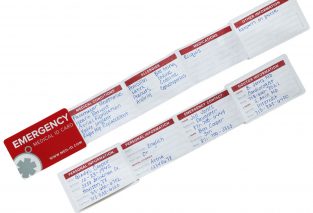Going to college for the first time is an exciting experience, but there are extra things to prepare for if your child has a chronic health condition or illness.
One of the most important things to do is to get your child a medical ID, or if they already have one, to update the information to be the most current as your kid moves to college.
Medical ID jewelry can be lifesaving if your kid has a chronic condition, especially in an emergency.
What Should be Included on a College Student’s Medical ID?
There are several pieces of key information that should be included on a medical ID for a college student. The most important things to include are the following:
- Wearer’s first and last name
- Exact medical condition
- Current medications
- Food or medication allergies
- Emergency contact information
- Primary physician’s contact information
If your child already wears a medical ID, you need to make sure the emergency contact information is up to date, especially if your child is moving out of the area to attend school.
Who to Communicate with at the School?
Communicating with a few important people at the college before your child moves can help to keep your child safe if an emergency occurs.
Resident Assistant
If they are living in the dorms, the resident assistant (“RA”) can provide support for easing the transition to university life. Resident assistants are in charge of the well-being of those living in the dorms so if your child is starting to feel stressed or unhealthy, they will have a point of contact that is there to help.
Roommate and Friends
You should encourage your child to speak with their roommates and new friends they make at the school. Being open about your child’s condition and having good communication about what to expect in an emergency can help the people that are around them in a medical emergency.
If they need specific support, ways of communication, or are prone to things like passing out or seizures, these things should be communicated in order to keep your child safe and in a supportive environment.
Health Center
Another good place to reach out to is the health center at the school. All university health centers are different so asking certain questions to make sure your child is prepared is important. Some questions to consider include:
- Do they have drop in counselling or how long does it take to get an appointment?
- Can they handle chronic conditions?
- Do they do routine checkups and vaccinations?
- Can they fill specific medications?
If the health center cannot support your child in a way that is needed, this will help you prepare beforehand.
While it is a challenging time to watch your child go away to school, you’ll feel better knowing that you have taken all the necessary precautions in the case of a medical emergency and your child can focus on their school!






